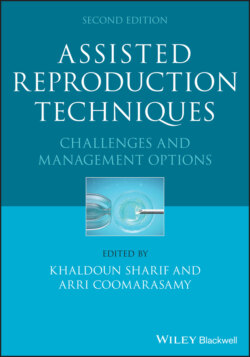Читать книгу Assisted Reproduction Techniques - Группа авторов - Страница 32
Answers to questions patients ask
Оглавление1 Q1 Can a woman with HIV receive fertility care? A1. Women who are HIV‐seropositive can achieve pregnancy in a variety of ways including through natural conception. However, depending upon their health status, the risk to themselves, their partner and their child may be significant if the condition is not well managed. Goals of therapy relate to minimizing the viral load of the female using HAART prior to conception and throughout the pregnancy in order to reduce the risk of transmission. Timed intercourse, IUI and IVF are all reasonable choices depending upon the circumstances of the patient and her partner once the HIV is well controlled.
2 Q2 Will my HIV medications interfere with my attempts to conceive? A2. In most cases women prescribed HAART should remain on their current medications while attempting to conceive, throughout the pregnancy and following delivery, in order to control the virus from replicating. The medications do not interfere with attempts to conceive. However, efavirenz, also known as EFV and Sustiva, is not considered safe during the first trimester (pregnancy category D in US) due to potential teratogenicity but may be used in later trimesters. However, in developing countries EFV is widely prescribed throughout pregnancy due to its low cost, ease of administration and relatively low risk profile. Collaborative management efforts involving the obstetrician and infectious disease doctor are important in order to select medications best suited to the patient’s needs throughout the course of her pregnancy.
3 Q3 Why do many programs exclude women with HIV from participating in fertility care? A3. American women with HIV are protected by the Americans with Disability Act (ADA) and therefore should not be discriminated against under federal law. This protection extends to employment, transportation, public accommodations, communications and access to state and local government services. Although the American Medical Association and the American Society for Reproductive Medicine have published opinions stating that physicians should not refuse treatment to HIV‐positive patients, it is conditional on the clinician’s competence and ability to treat such patients. Many fertility providers lack expertise within the field of infectious disease medicine or lack laboratory facilities to safely manage reproductive fluids and tissues and therefore will not offer the range of treatment options available to noninfected patients. In such cases, healthcare providers should refer care to centers staffed and equipped to manage the reproductive needs of virally infected patients.
4 Q4 Does HIV affect my reproductive organs? A4. Women with HIV commonly complain of menstrual irregularities. This is likely a result of hormonal aberrations created by the effect of the virus on the ovary or the medications used to control viral replication. Fertility rates appear to be lower in HIV‐seropositive women, and spontaneous miscarriage rates are higher. HIV affects the body’s immune system which may partly explain the lower implantation rate of embryos, although the exact mechanism underlying subfertility is unknown. Women with HIV also more commonly experience pelvic inflammatory disease which may damage the fallopian tubes and uterus, key components to normal reproductive function.
5 Q5 What is the chance my baby will have HIV as a result of my infection? A5. HIV may be passed from mother to child either through the bloodstream during pregnancy or later when breastfeeding. The risk to the fetus is greatest and may be as high as 25% if the mother is not prescribed HAART and has active viral replication. However, this risk is dramatically reduced to less than 1% if antiviral medication is provided. The goal of therapy is to attain undetectable viral load during pregnancy and delivery. Cesarean section delivery is recommended to further reduce transmission risk and breastfeeding avoided.
